 полная версия
полная версияThe Classic Myths in English Literature and in Art (2nd ed.) (1911)
83. Admetus and Alcestis. 102 Admetus was a suitor, with others, for the hand of Alcestis, the daughter of Pelias, who promised her to him who should come for her in a chariot drawn by lions and boars. This task Admetus performed by the assistance of his divine herdsman, and was made happy in the possession of Alcestis. But Admetus falling ill and being near to death, Apollo prevailed on the Fates to spare him on condition that some one should consent to die in his stead. Admetus, in his joy at this reprieve, thought little of the ransom, and, perhaps remembering the declarations of attachment which he had often heard from his courtiers and dependents, fancied that it would be easy to find a substitute. But it was not so. Brave warriors, who would willingly have periled their lives for their prince, shrunk from the thought of dying for him on the bed of sickness; and old servants who had experienced his bounty and that of his house from their childhood up were not willing to lay down the scanty remnant of their days to show their gratitude. Men asked, "Why does not one of his parents do it? They cannot in the course of nature live much longer, and who can feel like them the call to rescue the life they gave from an untimely end?" But the parents, distressed though they were at the thought of losing him, shrunk from the call. Then Alcestis, with a generous self-devotion, proffered herself as the substitute. Admetus, fond as he was of life, would not have submitted to receive it at such a cost; but there was no remedy. The condition imposed by the Fates had been met, and the decree was irrevocable. As Admetus revived, Alcestis sickened, rapidly sank, and died.
Just after the funeral procession had left the palace, Hercules, the son of Jupiter and Alcmena, arrived. He, to whom no labor was too arduous, resolved to attempt her rescue. Said he:
"I will go lie in wait for Death, black-stoledKing of the corpses!103 I shall find him, sure,Drinking, beside the tomb, o' the sacrifice:And if I lie in ambuscade, and leapOut of my lair, and seize – encircle himTill one hand join the other round about —There lives not who shall pull him out from me,Rib-mauled, before he let the woman go!But even say I miss the booty, – say,Death comes not to the boltered blood, – why, then,Down go I, to the unsunned dwelling-placeOf Koré104 and the king there, – make demand,Confident I shall bring Alkestis back,So as to put her in the hands of himMy host, that housed me, never drove me off:Though stricken with sore sorrow hid the stroke,Being a noble heart and honoring me!Who of Thessalians, more than this man, lovesThe stranger? Who that now inhabits Greece?Wherefore he shall not say the man was vileWhom he befriended, – native noble heart!"So, one look upward, as if Zeus might laughApproval of his human progeny, —One summons of the whole magnific frame,Each sinew to its service, – up he caught,And over shoulder cast the lion-shag,Let the club go, – for had he not those hands?And so went striding off, on that straight wayLeads to Larissa and the suburb tomb.Gladness be with thee, Helper of our world!I think this is the authentic sign and sealOf Godship that it ever waxes glad,And more glad, until gladness blossoms, burstsInto a rage to suffer for mankind,And recommence at sorrow: drops like seedAfter the blossom, ultimate of all.Say, does the seed scorn earth and seek the sun?Surely it has no other end and aimThan to drop, once more die into the ground,Taste cold and darkness and oblivion there:And thence rise, tree-like grow through pain to joy,More joy and most joy, – do man good again.So to the struggle off strode Herakles.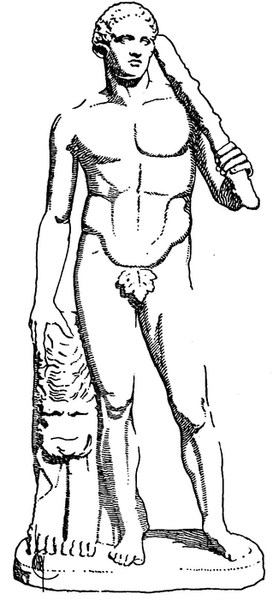
Fig. 65. Heracles
Long time the Thessalians waited and mourned. As for Herakles, no doubt they supposed him dead. When – but can it be?
… Ay, he it was advancing! In he strode,And took his stand before Admetos, – turnedNow by despair to such a quietude,He neither raised his face nor spoke, this time,The while his friend surveyed him steadily.That friend looked rough with fighting: had he strainedWorst brute to breast was ever strangled yet?Somehow, a victory – for there stood the strength,Happy, as always; something grave, perhaps;The great vein-cordage on the fret-worked front,Black-swollen, beaded yet with battle-dewThe golden hair o' the hero! – his big frameA-quiver with each muscle sinking backInto the sleepy smooth it leaped from late.Under the great guard of one arm, there leantA shrouded something, live and woman-like,Propped by the heartbeats 'neath the lion-coat.When he had finished his survey, it seemed,The heavings of the heart began subside,The helpful breath returned, and last the smileShone out, all Herakles was back again,As the words followed the saluting hand."Admetus," said he, "take and keep this woman, my captive, till I come thy way again." But Admetus would admit no woman into the hall that Alcestis had left empty. Then cried Herakles, "Take hold of her. See now, my friend, if she look not somewhat like that wife thou hast lost."
Ah, but the tears come, find the words at fault!There is no telling how the hero twitchedThe veil off; and there stood, with such fixed eyesAnd such slow smile, Alkestis' silent self!It was the crowning grace of that great heart,To keep back joy: procrastinate the truthUntil the wife, who had made proof and foundThe husband wanting, might essay once more,Hear, see, and feel him renovated now —Able to do now all herself had done,Risen to the height of her: so, hand in hand,The two might go together, live and die.Beside, when he found speech, you guess the speech.He could not think he saw his wife again:It was some mocking God that used the blissTo make him mad! Till Herakles must help:Assure him that no specter mocked at all;He was embracing whom he buried once,Still, – did he touch, might he address the true,True eye, true body of the true live wife?… And Herakles said little, but enough —How he engaged in combat with that kingO' the dæmons: how the field of contest layBy the tomb's self: how he sprang from ambuscade,Captured Death, caught him in that pair of hands.But all the time, Alkestis moved not onceOut of the set gaze and the silent smile;And a cold fear ran through Admetos' frame:"Why does she stand and front me, silent thus?"Herakles solemnly replied, "Not yetIs it allowable thou hear the thingsShe has to tell thee; let evanish quiteThat consecration to the lower Gods,And on our upper world the third day rise!Lead her in, meanwhile; good and true thou art,Good, true, remain thou! Practice pietyTo stranger-guests the old way! So, farewell!Since forth I fare, fulfill my urgent taskSet by the king, the son of Sthenelos."105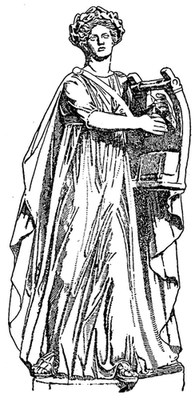
Fig. 66. The Palatine Apollo
84. Apollo, the Musician. Not only in Arcadia, Laconia, and Thessaly did Apollo care as a herdsman for the cattle of a mortal master; in Mount Ida, too, by the order of Jupiter he herded for a year the "shambling, crook-horned kine" of King Laomedon, and, playing on the lyre, aided Neptune to build the walls of Troy, just as Amphion, in his turn, had aided in the building of Thebes. Apollo's life as herdsman was spent in establishing wise laws and customs, in musical contests on the flute and the lyre, or in passages of love with nymphs and maidens of mortal mold.
85. Apollo, Pan, and Midas. 106 It is said that on a certain occasion Pan had the temerity to compare his music with that of Apollo and to challenge the god of the lyre to a trial of skill. The challenge was accepted, and Tmolus, the mountain-god, was chosen umpire. The senior took his seat and cleared away the trees from his ears to listen. At a given signal Pan blew on his pipes, and with his rustic melody gave great satisfaction to himself and his faithful follower Midas, who happened to be present. Then Tmolus turned his head toward the sun-god, and all his trees turned with him. Apollo rose, his brow wreathed with Parnassian laurel, while his robe of Tyrian purple swept the ground. In his left hand he held the lyre and with his right hand struck the strings. Tmolus at once awarded the victory to the lyric god, and all but Midas acquiesced in the judgment. He dissented and questioned the justice of the award. Apollo promptly transformed his depraved pair of ears into those of an ass.
King Midas tried to hide his misfortune under an ample turban. But his hair-dresser found it too much for his discretion to keep such a secret; he dug a hole in the ground and, stooping down, whispered the story, and covered it up. But a thick bed of reeds springing up in the meadow began whispering the story, and has continued to do so from that day to this, every time a breeze passes over the place.
86. Shelley's Hymn of Pan. In the following verses Pan taunts Apollo as he might have done when Midas was sitting contentedly by:
From the forests and highlandsWe come, we come;From the river-girt islands,Where loud waves are dumb,Listening to my sweet pipings.The wind in the reeds and the rushes,The bees on the bells of thyme,The birds on the myrtle bushes,The cicale above in the lime,And the lizards below in the grass,Were as silent as ever old Tmolus wasListening to my sweet pipings.Liquid Peneüs was flowing,And all dark Tempe lay,In Pelion's shadow, outgrowingThe light of the dying day,Speeded by my sweet pipings.The Sileni, and Sylvans, and Fauns,And the Nymphs of the woods and waves,To the edge of the moist river-lawns,And the brink of the dewy caves,And all that did then attend and followWere silent with love, as you now, Apollo,With envy of my sweet pipings.I sang of the dancing stars,I sang of the dædal Earth,And of Heaven – and the giant wars,And Love, and Death, and Birth, —And then I changed my pipings, —Singing how down the vale of MenalusI pursued a maiden, and clasp'd a reed:Gods and men, we are all deluded thus!It breaks in our bosom and then we bleed:All wept, as I think both ye now would,If envy or age had not frozen your blood,At the sorrow of my sweet pipings.87. Marsyas also was unfortunate enough to underrate Apollo's musical ability. It seems that the flute, an invention of Minerva's, had been thrown away by that goddess because Cupid laughed at the grimaces which she made while playing it. Marsyas found the instrument, blew upon it, and elicited such ravishing sounds that he was tempted to challenge Apollo himself to a musical contest. The god, of course, triumphed, and he punished Marsyas by flaying him alive.
88. The Loves of Apollo. Beside Psamathe of Argos, Coronis of Thessaly, and the nymph Clymene, who have been already mentioned, Apollo loved the muse Calliope, who bore him Orpheus,107 and the nymph Cyrene, whose son was Aristæus.108 Of his relations with other maidens the following myths exist.
89. Daphne. 109 The lord of the silver bow was not always prosperous in his wooing. His first love, which, by the way, owed its origin to the malice of Cupid, was specially unfortunate. It appears that Apollo, seeing the boy playing with his bow and arrows, had tauntingly advised him to leave warlike weapons for hands worthy of them and content himself with the torch of love. Whereupon the son of Venus had rejoined, "Thine arrows may strike all things else, Apollo, but mine shall strike thee."
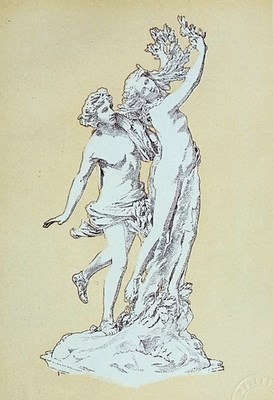
APOLLO AND DAPHNE
So saying, he took his stand on a rock of Parnassus, and drew from his quiver two arrows of different workmanship, – one to excite love, the other to repel it. The former was of gold and sharp pointed, the latter blunt and tipped with lead. With the leaden shaft he struck the nymph Daphne, the daughter of the river-god Peneüs, and with the golden one Apollo, through the heart. Forthwith the god was seized with love for the maiden, but she, more than ever, abhorred the thought of loving. Her delight was in woodland sports and in the spoils of the chase. Spurning all lovers, she prayed her father that she might remain always unmarried, like Diana. He consented, but, at the same time, warned her that her beauty would defeat her purpose. It was the face of this huntress maiden that Apollo saw. He saw the charming disorder of her hair, and would have arranged it; he saw her eyes bright as stars; he saw her lips, and was not satisfied with only seeing them. He longed for Daphne. He followed her; she fled swifter than the wind, nor delayed a moment at his entreaties. "Stay," said he, "daughter of Peneüs; I am not a foe. It is for love I pursue thee. I am no clown, no rude peasant. Jupiter is my father. I am lord of Delphi and Tenedos. I know all things, present and future. I am the god of song and the lyre. My arrows fly true to the mark; but alas! an arrow more fatal than mine has pierced my heart! I am the god of medicine and know the virtues of all healing plants. Alas! I suffer a malady that no balm can cure."

Fig. 67. Daphne
The nymph continues her flight and leaves his plea half-uttered. But even as she flies she charms him. The wind catches her garments, and her unbound hair streams loose behind her. The god, sped by Cupid, gains upon her in the race. His panting breath blows upon her hair. Her strength begins to fail, and, ready to sink, she calls upon her father, the river-god: "Help me, Peneüs! open the earth to inclose me, or change my form, which has brought me into this danger!" Scarcely had she spoken when a stiffness seized her limbs; and little by little she took on the appearance of a laurel tree. Apollo embraced the branches and lavished kisses on the wood. The branches shrank from his lips. "Since thou canst not be my wife," said he, "thou shalt assuredly be my tree. I will wear thee for my crown. I will decorate with thee my harp and my quiver. When the Roman conquerors conduct the triumphal pomp to the Capitol, thou shalt be woven into wreaths for their brows. And, as eternal youth is mine, thou also shalt be always green, and thy leaf know no decay." The laurel tree bowed its head in grateful acknowledgment.
The delicious humor of Lowell's extravaganza upon the story amply justifies the following citation:
Phœbus, sitting one day in a laurel tree's shade,Was reminded of Daphne, of whom it was made,For the god being one day too warm in his wooing,She took to the tree to escape his pursuing;Be the cause what it might, from his offers she shrunk,And, Ginevra-like, shut herself up in a trunk;And, though 't was a step into which he had driven her,He somehow or other had never forgiven her;Her memory he nursed as a kind of a tonic,Something bitter to chew when he'd play the Byronic,And I can't count the obstinate nymphs that he brought overBy a strange kind of smile he put on when he thought of her."My case is like Dido's," he sometimes remarked;"When I last saw my love, she was fairly embarkedIn a laurel, as she thought – but (ah, how Fate mocks!)She has found it by this time a very bad box;Let hunters from me take this saw when they need it, —You're not always sure of your game when you've treed it.Just conceive such a change taking place in one's mistress!What romance would be left? – who can flatter or kiss trees?And, for mercy's sake, how could one keep up a dialogueWith a dull wooden thing that will live and will die a log, —Not to say that the thought would forever intrudeThat you've less chance to win her the more she is wood?Ah! it went to my heart, and the memory still grieves,To see those loved graces all taking their leaves;Those charms beyond speech, so enchanting but now,As they left me forever, each making its bough!If her tongue had a tang sometimes more than was right,Her new bark is worse than ten times her old bite."11090. Marpessa. Another maiden who declined Apollo's love was Marpessa.[1] She is called by Homer "the fair-ankled daughter of Evenus."
The god Apollo from the heaven of heavensHer mortal sweetness through the air allured;[2]but Idas, "that was strongest of men that were then on earth,"111 carried her off, assisted by Poseidon who gave him a winged chariot. Her father Evenus vainly tried to catch up with the fleeing lovers; but Apollo found them in Messene, and wrested the maiden away. Then Jupiter, while the lovers were engaged in combat, separated them, saying, "Let her decide."
They three together met; on the one side,Fresh from diffusing light on all the worldApollo; on the other without sleepIdas, and in the midst Marpessa stood.Just as a flower after drenching rain,So from the falling of felicityHer human beauty glowed, and it was new;The bee too near her bosom drowsed and dropped.[2]According to the story as romantically told by the English poet Phillips, first spoke Apollo. The god told her that he dreaded that one so fair should ever taste of sorrow and death; how, if she lived with him, she should bide immortal, scattering joy without intermission, lighting the world, bringing bliss to struggling men and sorrowing women, dispelling shadows and shadowy fear.
In mere felicity above the worldIn peace alive and moving, where to stirIs ecstasy, and thrilling is repose,112Then Idas, humbly, —
"After such argument what can I plead?Or what pale promise make? Yet since it isIn women to pity rather than to aspire,A little will I speak."And he tells her simply that he loves her, – loves her not only for her beauty, but
"Because Infinity upon thee broods;And thou art full of whispers and of shadows; – "and because her voice is music, her face mystery beyond his power to comprehend;
"O beauty lone and like a candle clearIn this dark country of the world! Thou artMy woe, my early light, my music dying."And Marpessa? —
As he was speaking, she with lips apartBreathed, and with dimmer eyes leaned through the airAs one in dream, and now his human handTook in her own; and to Apollo spoke, —saying that she knew how sweet it might be forever with a god to aid suffering men and women and "gild the face that from its dead looks up"; but still she feared immortality, for, though dying not, she must grow old, and her god lover would tire of her when once her youth was faded. And as for that "existence without tears for evermore" which he promised, —
"Yet I being human, human sorrow miss.The half of music, I have heard men say,Is to have grieved."To sorrow she was born. It is out of sadness that men have made this world beautiful. If she chooses Idas, then they two will prosper together, grow old together, and last descend into the "natural ground," and "leave behind a wholesome memory on the earth."
When she had spoken, Idas with one cryHeld her, and there was silence; while the godIn anger disappeared. Then slowly they,He looking downward, and she gazing up,Into the evening green wandered away.91. Clytie. 113 In the story of Clytie the conditions are reversed. She was a water-nymph and in love with Apollo, who made her no return. So she pined away, sitting all day long upon the cold ground with her unbound tresses streaming over her shoulders. Nine days she sat, and tasted neither food nor drink, – her own tears and the chilly dew her only sustenance. She gazed on the sun when he rose; and as he passed through his daily course to his setting, she saw no other object, – her eyes fixed constantly on him. At last, they say, her limbs took root in the ground and her face became a flower, turning on its stem to follow the journeying sun.
In the following lines, Thomas Moore uses the flower as an emblem of constancy:
The heart that has truly loved never forgets,But as truly loves on to the close;As the sunflower turns on her god when he setsThe same look that she turned when he rose.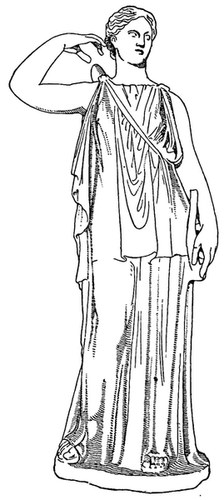
Fig. 68. Artemis
92. Myths of Diana. In company with her radiant brother, we find Diana subduing Tityus and the Python and assisting in the punishment of Niobe. The speedy transformation of Daphne has been attributed to this goddess, the champion of maidenhood. According to some, it was she, too, that changed Callisto into a bear, when for love of Jupiter that nymph deserted the huntress-band. Numerous are the myths that celebrate the severity of the goddess of the unerring bow toward those who offended her. How she served Agamemnon for slaying one of her hinds is told in the story of Troy;114 how she punished Œneus for omitting a sacrifice to her is narrated in the episode of the Calydonian hunt.115 Similar attributes of the goddess are exemplified in the myths of Arethusa, Actæon, and Orion. It is only when she is identified with Selene, the peaceful moonlight, that we perceive a softer side of character, such as that displayed in her relations with Endymion.
93. The Flight of Arethusa. 116 A woodland nymph of Elis was this Arethusa; she delighted not in her comeliness, but in the joys of the chase. One day, returning from the wood heated with exercise, she descended to a stream silently flowing, so clear that you might count the pebbles on the bottom. She laid aside her garments; but while she sported in the water, she heard an indistinct murmur rising as out of the depths of the stream. She made haste to reach the nearest bank. A voice followed her, "Why flyest thou, Arethusa? Alpheüs am I, the god of this stream." The nymph ran, the god pursued. Arethusa, at last exhausted, cried for help to Diana, who, hearing, wrapped her votary in a thick cloud. Perplexed, the river-god still sought the trembling maiden. But a cold sweat came over her. In less time than it takes to tell, she had become a fountain. Alpheüs attempted then to mingle his stream with hers. But the Cynthian queen cleft the ground, and Arethusa, still endeavoring to escape, plunged into the abyss and, passing through the bowels of the earth, came out in Sicily, still followed by the passionate river-god.
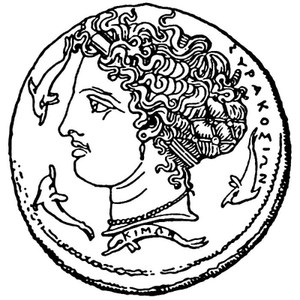
Fig 69. Arethusa
94. Shelley's Arethusa. In the following version of the pursuit, Arethusa was already a river when Alpheüs espied her.
Arethusa aroseFrom her couch of snowsIn the Acroceraunian mountains, —From cloud and from crag,With many a jag,Shepherding her bright fountains,She leapt down the rocks,With her rainbow locksStreaming among the streams; —Her steps paved with greenThe downward ravineWhich slopes to the western gleams:And gliding and springingShe went, ever singing,In murmurs as soft as sleep;The Earth seemed to love her,And Heaven smiled above her,As she lingered towards the deep.Then Alpheüs boldOn his glacier cold,With his trident the mountain strookAnd opened a chasmIn the rocks; – with the spasmAll Erymanthus shook.And the black south windIt concealed behindThe urns of the silent snow,And earthquake and thunderDid rend in sunderThe bars of the springs below;The beard and the hairOf the River-god wereSeen through the torrent's sweep,As he followed the lightOf the fleet nymph's flightTo the brink of the Dorian deep.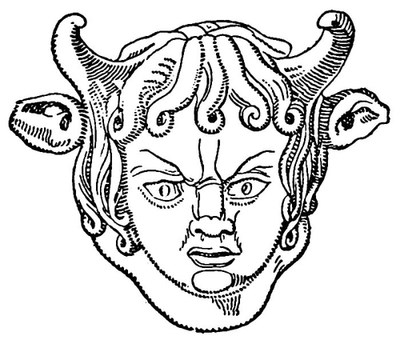
Fig. 70. A Young River-god
"Oh, save me! Oh, guide me!And bid the deep hide me,For he grasps me now by the hair!"The loud Ocean heard,To its blue depth stirred,And divided at her prayer;And under the waterThe Earth's white daughterFled like a sunny beam;Behind her descendedHer billows unblendedWith the brackish Dorian stream: —Like a gloomy stainOn the emerald main,Alpheüs rushed behind, —As an eagle pursuingA dove to its ruinDown the streams of the cloudy wind.Under the bowersWhere the Ocean PowersSit on their pearlèd thrones,Through the coral woodsOf the weltering floods,Over heaps of unvalued stones;Through the dim beamsWhich amid the streamsWeave a network of colored light;And under the caves,Where the shadowy wavesAre as green as the forest's night:Outspeeding the shark,And the swordfish dark,Under the ocean foam,And up through the riftsOf the mountain cliftsThey past to their Dorian home.And now from their fountainsIn Enna's mountains,Down one vale where the morning basks,Like friends once partedGrown single-hearted,They ply their watery tasks.At sunrise they leapFrom their cradles steepIn the cave of the shelving hill;At noontide they flowThrough the woods belowAnd the meadows of Asphodel:And at night they sleepIn the rocking deepBeneath the Ortygian shore; —Like spirits that lieIn the azure skyWhen they love but live no more.
95. The Fate of Actæon. 117 Diana's severity toward young Actæon, grandson of Cadmus whose kindred fell under the curse of Mars, is thus narrated.


